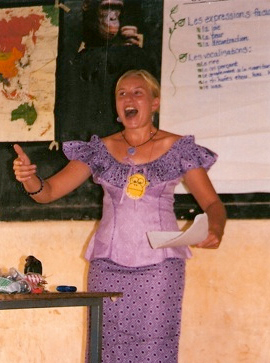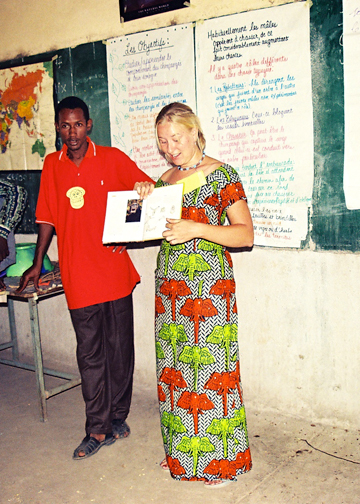- Drawing from her personal experience as a primate educator and the challenges she saw others facing, Amy Clanin envisioned a network that would advance the field of primate conservation education by addressing three needs of educators: connections, resources, and services.
- It was this vision that led her to create the Primate Education Network (PEN).
- PEN is at the forefront of primate conservation education, providing a community and collaboration platform for primate educators.
Amy Clanin, Founder and Executive Director of Primate Education Network (PEN), talks to Mongabay.com about connecting and empowering primate conservation educators.
Drawing from her personal experience as a primate educator and the challenges she saw others facing, Amy Clanin envisioned a network that would advance the field of primate conservation education by addressing three needs of educators: connections, resources, and services. It was this vision that led her to create the Primate Education Network (PEN). PEN is at the forefront of primate conservation education, providing a community and collaboration platform for primate educators.
“I like to say that my mom had something to do with creating my destiny,” explains Amy Clanin. “When she went into labor with me, she refused to go to the hospital until she watched the end of the King Kong movie. A few years later, my mother, who was a musician, delivered singing telegrams in a gorilla suit and tutu.”
These childhood experiences were telling; Clanin has gone on to devote her entire career to primate conservation, and holds degrees in Primate Behavior and Ecology and Anthropology.
 Amy Clanin demonstrating a chimpanzee vocalization in Senegal. The students roared with excitement, and then they repeated after her. Photo courtesy of Amy Clanin. |
“I began my career by giving tram tours at the Knoxville Zoo and facilitating guided observations of world-renowned signing chimpanzees at the Chimpanzee and Human Communication Institute in Ellensburg, WA,” she says. “I studied monkeys in Costa Rica and worked with great ape conservation organizations in Uganda, Borneo, Rwanda, and the Democratic Republic of Congo. I also designed and managed an education and outreach project on chimpanzees as a Peace Corps Volunteer in Senegal.”
Clanin serves as PEN’s Executive Director, applying her specializations in primatology, conservation education, and non-profit leadership. She leads a dedicated and dynamic team, who share a common conviction and passion for primate conservation education. Clanin says, “This has become the fuel for PEN’s growth and success.”
She adds, “PEN was a long time in the making. My ideas for the network evolved over a decade. I spent more than five years working on operations, program management, and fundraising at non-profit conservation organizations in Washington, D.C. I was ready to start my own initiative and take on something more challenging. I wanted to utilize my expertise, passion, and entrepreneurial spirit to have more impact and solve systemic problems in primate conservation education.”
Importantly, her experiences as a primate educator inspired her to create the network. Throughout her career, Clanin saw her colleagues in primate education consistently encounter similar challenges, such as a lack of expertise, resources, and collaboration – just to name a few.
“Without sufficient resources and training, it’s hard to get an education project off the ground in primate habitat countries,” she explains. “There is also a demand for existing primate education projects to design and improve their monitoring and evaluation components.”

Ahmed El Harrad: PEN’s March Educator of the Month. Photo by: Barbary Macaque Conservation in the Rif.
Beginning in late 2011, Clanin conducted eight months of informational interviews with experts in her field to confirm the need for an organization like PEN and to avoid replicating any existing efforts. She spoke to Dr. Janette Wallis, Vice President for Conservation with the International Primatological Society (IPS), who shared that the society had previously considered the possibility of expanding their website to serve as a resource for primate education. Wallis connected Clanin with Dr. Francine Dolins, who organized a workshop at the 2008 IPS Congress in Scotland, which led to a publication dedicated to conservation education in the American Journal of Primatology. Given Dolins’ prior experience, Clanin invited her to partner with her on sending a survey to further evaluate and verify the need for PEN.
Finally, in August 2012, Clanin presented her ideas for the network and the survey results at the IPS Congress in Mexico.
“The response was overwhelmingly positive among my colleagues.”
PEN serves as a one-stop-shop for all things primate education. The network creates opportunities for educators to connect and build relationships online and offline, share resources and best practices, and receive the training and support needed to design and deliver successful primate education programs.
PEN is developing a scalable model for information sharing and collaboration in primate conservation that fosters evidence-based learning and delivers measurable results. The network achieves this through online tools and resources, as well as establishing a field presence through Regional Coordinators based in eight countries in Latin America, Africa, and Asia.
 Amy Clanin in Senegal explaining the different roles of chimpanzees during a monkey hunt. Photo courtesy of Amy Clanin. |
“Evidence-based learning is a significant part of PEN’s approach,” Clanin notes. “When I created this network, I knew that I wanted to focus on featuring local educators and increasing transparency in primate education. PEN promotes information sharing to prevent other educators from having to reinvent the wheel.”
“Our impact is both global and local.”
PEN’s global impact is driven by online tools. For example, educators can utilize PEN’s Resource Library, a globally accessible, open source, and free collection of downloadable primate education lesson plans, curricula, manuals, guides, kits, and educational games and activities. Additionally, using their Worldwide Primate Education Directory, which is currently in development and near completion, primate educators anywhere in the world with access to the Internet will be able to search for and register projects.
The network’s local impact is driven by their Regional Coordinators, who are developing a holistic understanding of their region’s progress in primate education. Regional Coordinators connect directly with primate educators in their respective regions to learn about their work and engage them in the network through presentations, workshops, trainings, and other collaborative activities. They also source and share PEN’s collected and curated primate education resources, as well as identify ways to highlight educators’ work through their global network.
“These educators are the real heroes of primate conservation education. We’re honoring their work by sharing their stories through a nomination process,” explained Clanin regarding the Educator of the Month blog series. “Educators are a powerful voice for primates, but prior to the establishment of PEN, you rarely – if ever – heard about their successes and challenges. I wanted to provide a podium for them, so that they could emerge on the international stage. In order to foster dialogue and synergy, we’re introducing the local champions of primate education. I created the Educator of the Month series, along with our Voices from the Field, to amplify the voices of primate educators. Through these series, we’re spotlighting their efforts and connecting them with other educators.”

Villagers sharing a book on great apes following Amy Clanin’s workshop on chimpanzees in Senegal. Photo by: Amy Clanin.
PEN also offers end-to-end services to fund, design, train, implement, and evaluate primate education programs. By providing the tools, resources, and training educators need to implement effective programs, the network hopes to empower them to inspire communities to value and safeguard primates and their natural habitats. In leveraging their resources and connections, PEN’s long-term goal is to design scalable primate education programs at regional levels to further increase knowledge, change attitudes, and influence behavior.
“PEN has achieved a great deal in six months of existence, but we’ve only just begun. We’re starting small, but thinking big,” Clanin says. “Every day, my team and I listen to the stories of primate educators. We learn about the challenges they face and strategize how best this network can help accelerate their effectiveness in the field.”
PEN’s culture is to celebrate small victories, but as a team, they want to scale up ideas to drive success and yield significant results for primate conservation.
“With more than half of the world’s 633 primate species and subspecies classified as threatened with extinction, we need to support primate educators in their efforts to prevent further decline. I encourage readers to read and listen to the inspiring stories and voices of the primate educators featured on PEN’s website.”
With increased support, PEN can continue to build the capacity of primate educators, facilitate collaboration, and bring international attention to their important grassroots work that motivates local communities to make commitments to conserve primates.
“There is power in working together to achieve bigger results in primate conservation. We can achieve so much more working collaboratively. PEN’s hope for the future is to expand the network in more countries and to provide more resources, tools, training, and support for educators working on the frontlines of primate conservation.”
PEN’s global network is composed of experienced professionals in the fields of primatology, conservation education, design, technology, media, and more. But Clanin says that at this time, PEN’s biggest needs include fundraising, graphic design, and web development.
“I welcome anyone interested in getting involved to visit our website, fill out the simple online form, and upload their CV at www.primateeducationnetwork.org/volunteer.”
If you would like to make a tax-deductible contribution to PEN, please visit www.primateeducationnetwork.org/donate.

Amy Clanin with two students observing chimpanzees at the Fongoli research site in Senegal. Photo courtesy of Amy Clanin.

Denis Agaba: PEN’s May Educator of the Month. Photo courtesy of the Great Apes Film Initiative.

Dondo Kante (far right) PEN’s December Educator of the Month at one of Amy Clanin’s chimpanzee workshops in Senegal, teaching students how to ‘fish-for-termites’ using peanut butter and raisins. Photo by: Amy Clanin.
The Primate Education Network | Blog
The Primate Education Network on Facebook | Twitter | Pinterest | LinkedIn